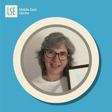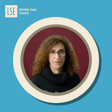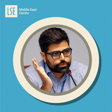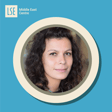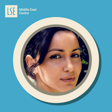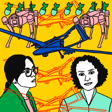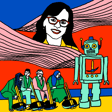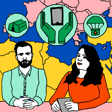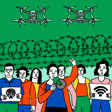Become a Creator today!Start creating today - Share your story with the world!
Start for free
00:00:00
00:00:01

Episode 2: Simon Mabon on Outside Positionality and Shared Humanity
In this episode, Anne Kirstine speaks with Simon Mabon about the privileges that come with his positionality and how he, as an outsider, builds trustful and ethical relations with his interlocutors. Simon also shares his thoughts on the role of positionality in teaching and supervision of students.
Simon is Chair in International Politics at Lancaster University and co-director of the Richardson Institute. His work focuses on sovereignty, sectarianism and regional order in the Middle East, and his recent book, The Struggle for Supremacy in the Middle East: The Rivalry between Saudi Arabia and Iran was published earlier this year.
Transcript
Introduction to the Podcast
00:00:02
Speaker
Hello and welcome to Conversations on Positionality, a podcast brought to you by the LSE Middle East Centre. My name is Anne Kirsten Rohn.
Anne's Research Journey
00:00:12
Speaker
I'm a visiting fellow at the Centre and in this podcast I set out on a journey to explore how who we are as researchers shapes the work we do.
00:00:21
Speaker
In my own work, I often travel to contexts which are different from the one I grew up in and talk to people whose lives differ significantly from mine. And that has made me think a lot about how my nationality, gender, age and personality play out in my relations with people in the field.
00:00:40
Speaker
It has also made me wonder how we as researchers can become more aware of the challenges and opportunities that come with our positionalities, and how we can strengthen the awareness about positionality within our academic institutions. To help me understand these questions better, I've invited a series of colleagues to share experiences and reflections from their work.
Simon's Book and Positionality
00:01:02
Speaker
And in this episode, I'm joined by Professor Simon Mabin.
00:01:06
Speaker
Simon is Chair in International Politics at Lancaster University and co-director of the Richardson Institute. His work focuses on sovereignty, sectarianism and regional order in the Middle East. And earlier this year, he published a new book with Cambridge University Press titled The Struggle for Supremacy in the Middle East, The Rivalry Between Saudi Arabia and Iran.
00:01:30
Speaker
And besides this, Simon is director of CEPAD, a collaborative international research project on sectarianism proxies and desectarianisation. And one of the things I'm curious to hear him about is how he reflects on positionality in his role as a research leader and supervisor. But first of all, I want to say welcome to you, Simon, and thank you for being on the podcast.
Approach to Self-Reflection
00:01:56
Speaker
Thank you for having me on the podcast. It's very exciting.
00:01:59
Speaker
Indeed it is. We've been working together for some years now as part of Project Separate, and we've had numerous conversations about positionality. But one thing that strikes me is that we never really discuss the term itself and what it means. So I'd actually like to begin by hearing you, how you understand the concept of positionality.
00:02:20
Speaker
Yeah, thanks. I mean, people have written extensive, detailed, rich philosophical tomes on this. But I think my approach to positionality is broadly driven by a relatively basic premise, and that's to reflect on who you are, the things, experiences, attitudes that shape who you are and how you engage with the world.
00:02:44
Speaker
and acknowledging those sort of experiences, assumptions, and entanglements, if you will, is really central to reflecting on positionality, I think. So relatively basic, but not basic in the slightest.
00:03:00
Speaker
Well, definitely not basic in the slightest. And I tend to agree with you that positionality is also about reflecting on these intangible things that you mention. But I'm still curious to hear when you are doing your work, when you're in the field, I suppose there's some aspects of your positionality that tend to play a bigger role.
Shared Humanity in Research
00:03:19
Speaker
So which aspects of your own positionality do you reflect on the most in your work?
00:03:25
Speaker
So I think there's a couple of ways of taking this. There's the aspects of positionality that I'm conscious of and incredibly careful to downplay and incredibly careful to check and to leave at the door, so to speak. And then there's aspects of me as who I am that I want to articulate and emphasize. And I think starting with that, because I think that's a more positive component, the thing that I really want to emphasize is the shared humanity.
00:03:52
Speaker
I think it's all too easy to get bogged down in forms of division and identity markers that divide. Whereas there is a fundamental thing that unites us, and that is our common humanity, our sense of being people. That is the sort of the most fundamental aspect of all of this. And a shared humanity breeds a sense of empathy. And particularly when talking to people from vulnerable communities, people who've endured
00:04:17
Speaker
incredibly traumatic experiences like many of the people of the region have over the past decade or so.
00:04:24
Speaker
I think it's really important to emphasize that humanity, to emphasize that whilst we are striving for a broad, critical, aspirational objectivity, fundamentally we're all people and we have that shared sense of experience that really should be emphasized and through that empathized. And I think that's really
00:04:48
Speaker
right at the core of what it is that I'm trying to do when I'm doing interviews, trying to develop a sense of safety and shared humanity. But in doing that, of course, there are things that I have to check, there are things that I have to leave at the door, and I have to be conscious of my positionality, of the biases, of the identity markers that distinguish me from others and leave me in positions of privilege.
Outsider Status and Solidarity
00:05:11
Speaker
Could you perhaps say a bit more about these things you tend to leave at the door? What aspects of your positionality is it that you seek to downplay?
00:05:21
Speaker
Well, I think the biggest thing is that I am fundamentally an outsider, right? I'm an outsider to communities on a whole host of different levels. And that can be seen in the sense that once I finish the interview, either I literally get up and leave a room or I end a call or whatever it is, I am withdrawing from that environment and others do not have that luxury. And how do you address that in practice?
00:05:49
Speaker
You address it head on, I guess. You acknowledge that privilege. You acknowledge that this is a lived reality for people, particularly those in vulnerable contexts or people who've endured trauma. You acknowledge that that is a lived reality, a daily reality.
00:06:05
Speaker
and for me i have the luxury the privilege of being able to step back of course you never fully step back from it you never just erase it from your memory but it's a completely different way of living with and engaging with those experiences so i think building that solidarity building that commonality with an interviewee particularly from those particular backgrounds
00:06:26
Speaker
is really important. Following up, maintaining relationships, maintaining contact. And some of the interviewees that I engage with for the book are people I've been talking with for the past decade or so. So having that longer term relationship, I think really helps to demonstrate that you are empathetic, that you are trying to articulate their voices rather than sort of swooping into communities
00:06:53
Speaker
cherry picking these quotes to support the arguments that you've already approached coming into the interview and then swooping out, if you will. I'm curious to hear you, Simon. When you show solidarity, what do you say in
Empathy, Solidarity, and Neutrality
00:07:08
Speaker
practice? Because I was thinking, is showing solidarity and empathy also a way of compromising a sort of neutrality? I don't think we're ever really neutral, right? We have our
00:07:21
Speaker
our own views of the world, we have our own ways of engaging with the world, which is partly a product of our upbringing, of our socialisation, but it's also partly a result of the work that we're doing, the engagements with the world that we have from our scholarship, and showing solidarity by expressing sympathy, empathy, common humanity for someone who's been displaced from their home.
00:07:46
Speaker
I don't think that pushes you away from neutrality or someone who's endured conflict or torture. That's not neutrality. That's common decency and a sense of humanity that really should be there when having conversations with people. I think I'd be criticized for it for some hardcore political scientists, but I'm OK with that. I'm OK with those criticisms. Do you think it's even more important for outsiders like us to express this sympathy and solidarity?
00:08:15
Speaker
I think it's a really tricky one, right? Because what we're dealing with is being in a position of an outsider, an outsider to a community, which raises questions about authority, authenticity, as to who can speak about those communities, who can speak and articulate those communities, grievances, voices, experience, et cetera. Who is it that is able to do that? But that's also playing out in the context of a century of colonial
00:08:43
Speaker
exploitation, colonial experience, racism, devastating foreign policy decisions.
00:08:52
Speaker
So there's a whole host of issues that are shaping this, and it's very easy to be seen as being exploitative on the back of all of that. And it's very easy to be cynical about someone who comes and expresses those types of commonalities and solidarities in pursuit of a particular thing. You want to get some good stories to tell for your next book, so you build that relationship and then you discard it.
00:09:18
Speaker
And that's why I think it's important to have those longer term relationships where necessary. And of course, this is just speaking with and about particular communities. This isn't necessarily the case when I was interviewing former officials, for instance. Yeah, but as to say, maybe building these long term relationships is also a way for you to show that your empathy is genuine and not just an instrument for you to get access to people.
00:09:46
Speaker
Yeah, exactly. Exactly. And that, I think, is really important. And it's acknowledged in a number of ways by people if they sense that it's genuine. How can you feel when people sense that your empathy is genuine? How do you usually see that? I see it in the types of conversations that we have. I see it in the types of interactions that we have. You know social dynamics, and you know when someone's not particularly interested in talking, or someone who's
00:10:16
Speaker
sort of keeping themselves reserved just through our own experiences of life. And then you also know when someone builds that rapport with you and opens up and you can sense a degree of trust.
00:10:28
Speaker
You're also spending a good part of your work time supervising PhD students, being a leader of a collaborative research project where you sort of set the direction of other people's work in a sense. Do you reflect on your positionality in a different way when you're wearing the hat of a research leader?
00:10:49
Speaker
Yeah, I guess so. I guess it's a different type of privilege, right? And I keep coming back to privilege in this conversation, which, of course, isn't synonymous with positionality. But in the case of me being a tenured professor at a British institution with good salary, a good post, the opportunity to go and do research, all of these things, stable job, the support of some wonderful colleagues, yourself included, just putting that out there.
00:11:17
Speaker
I feel very, very lucky, very privileged. And I realize that there are a whole host of things that I have that other people don't have. And so that is something that I constantly reflect on in a number of different ways, a number of
Supervising Diverse PhD Students
00:11:32
Speaker
different arenas. And I think embarking on these conversations, I have to do it in a way that acknowledges that for me, it's relatively easy to have these conversations.
00:11:42
Speaker
But for other people, it isn't always going to be easy to have conversations about positionality, about privilege. There's all manner of issues bound up in it from sort of socialization, from experience, from
00:11:58
Speaker
particular instances across their lives, be it the academic or the non-academic, that condition how people react when you say positionality. For instance, talking with some of my PhD students from the region, and you mentioned positionality, and there has been on occasion a sense of confusion, of utter bewilderment. What is positionality?
00:12:20
Speaker
the sense that we as researchers are pursuing objective truth, scientific engagement with reality from a real positivist position. And me asking them to reflect on their own position, their own biases, their own privileges, their own experiences can be challenging and personally quite problematic. And in some cases, it can involve a real sort of deconstruction of the very notion of the self
00:12:49
Speaker
I can give you an example of one who was from the Gulf whose PhD was fascinating on societal divisions, and I'm being deliberately vague here, but they were complicit in reproducing those very lines of division that they were examining. And that was sort of an unintended consequence of socialization.
00:13:13
Speaker
and reflecting on positionality prompted a sort of a deeper existential deconstruction of the very sense of identity that they had been brought up with. That must have put you in a really challenging position because as you mentioned, you are the privileged person in that conversation. So how do you challenge this PhD student on their views without re-emphasizing the power relationship
00:13:39
Speaker
When I start with PhD students, I always stress that this is a relationship that isn't hierarchical. It's one of shared learning.
00:13:48
Speaker
the shared pursuit of knowledge and that I hope to learn from them as much as they will hopefully learn from me. And so I articulate that this is a shared journey and that I will try and share my knowledge of particular things and I will hopefully learn from them. And as a consequence of that, it kind of builds up this mutual rapport of joint learning, joint intellectual rumination, if you will. And so when I ask questions as to why
00:14:12
Speaker
certain terminology has been used or what it means to be saying those types of things. It's taken in the right spirit, I think, rather than a reinforcement of like a critical, why are you doing this? Okay, so what you're saying is that it's actually important to also pave the way. Yeah. Or prepare the ground for having these sensitive conversations about positionality from a very early stage, perhaps even from the moment you meet your PhD student for the first time.
00:14:41
Speaker
Yeah, very much so. And I think if you talk to any of my PhD students, they will tell you that that is something I do very, very early because I believe it's the way to get a safe space for PhD students, or any students for that matter, to be able to reflect on incredibly sensitive, challenging matters that many of them are wanting to pursue in their research.
00:15:05
Speaker
And it's also something that's useful for the scholarly journey that they go on and that I'm privileged to go along with them. I'd like to go a little bit back to your role as researcher and your work as researcher. So we've already touched a bit on this, but I would like to go a little bit deeper into the challenges and opportunities that come with your particular personality
Identity and Privilege in Research
00:15:27
Speaker
and how you navigate those.
00:15:29
Speaker
Because I was thinking if we look at today's world more widely, I guess many people would say that being a white male from the UK is probably one of the most privileged positions one can have. But do you also think this gives you certain privileges in your work as a researcher?
00:15:46
Speaker
Yeah, for sure. I am incredibly privileged to be born into the time and space that I was born into. I grew up in a broadly working class background, so there are class dimensions to my own positionality, but putting those aside, there are, yeah, I'm very, very fortunate to be where I am and to have the journey that I've been on.
00:16:11
Speaker
And that has, over time, opened many, many doors. And I'll give you an example. I was going to do research in Bahrain the last time I was allowed in. And this was in the spring of 2014. So it was a relatively sensitive time. It was a time when large numbers of academics were being turned away.
00:16:33
Speaker
and I was half expecting to be turned away but by virtue of some of the relationships that I'd built up and by virtue of my nationality I was able to arrange a meeting with the British ambassador to Bahrain and I had a letter from his office that ultimately helped get me into the country to do the interviews that I wanted to do while I was there. Without that letter, without that invitation, I doubt I would have been let in
00:17:02
Speaker
colleagues of mine from Lancaster and elsewhere were later turned away. So I think that that letter stems from me being a British national and me being who I am in the position that I am in opened a door essentially. I think that's a really good example Simon. I'm also curious to hear whether you being a white male UK citizen has sometimes been a backdrop
00:17:27
Speaker
Yeah, of course it has. And this goes back to what we were saying right at the start about inclusion and exclusion and authentic voices and who has the authority and the ability to speak on behalf of people. And this is a debate that I continue to have with myself. It's probably the thing that I've asked myself the most over my research career.
00:17:49
Speaker
And also I have debates with PhD students and colleagues as to whether I have any right to be doing the work that I'm doing, whether I have the moral authority to even ask the questions that I'm asking, let alone to talk to the people that I'm talking to about the topics that I'm interested in.
00:18:07
Speaker
And it's a topic that I go back and forth on. It's a difficult one because, of course, I've shaped my career on doing the things that I've been doing. But there is a strong argument to say that I shouldn't have a right to do that because I'm an outsider. And what do you believe gives you the right to continue your research?
00:18:26
Speaker
people from the region who tell me that I do have a right to ask those questions, who think that the type of scholarship that I'm producing and the way that I'm producing it is of value and of interest and amplifies voices that aren't necessarily always amplified.
Validation from the Region
00:18:44
Speaker
And in that respect, that gives me the momentum to keep going for a few more days. But then the existential doubts start again. Because I've been criticized for this in the past, rightly so, that I don't have the authentic right to speak about particular topics because I am not members of those particular communities.
00:19:07
Speaker
But then the argument that some people from the region who disagree with that premise is that my training, the particular type of engagement that I do, allows me to have a different perspective from those in the region who are invested so personally in many of these topics. So their argument is that me having a little bit of distance actually is useful in allowing me to reflect on the types of things that I'm reflecting on.
00:19:34
Speaker
That actually touches on another question I've been wanting to ask you, because we've talked so far mostly about how we reflect on ourselves, on our own positionality. But something which is, I think, just as relevant is how do we get to know how people view us?
00:19:52
Speaker
How do we get to know if the positionality that we try and push you, that we try and adopt, is actually also consistent with the way that people see us. So I'd like to hear your reflections on, say you're doing research in Bahrain, how do people view you? How do you think people view you?
00:20:11
Speaker
The answer, I think, to the last part of the question is I think people view me in lots of different ways, depending on their own positionality, which is probably a longer conversation to have in a more Gulf slash Bahrain-focused setting rather than this one. But in terms of the more existential part of the question, I think the only way to do it is to ask and be open to honest
00:20:36
Speaker
assessments of what it is that you're doing. And when you were asking that question, I was thinking of conversations I've had with colleagues in completely different disciplines and looking at completely different parts of the world on decolonization and the broader quest to decolonize knowledge production and to decolonize engagement with the global south more broadly. And that starts at home, of course, it starts in the family, it starts in local communities, in
00:21:04
Speaker
quote-unquote the West, the global north, whatever you want to use, but it also starts with the self and the way to do that is to open yourself up to very uncomfortable truths, claims, observations about your own experience, your own privilege and your own complicity in a whole manner of things that are not comfortable to acknowledge.
00:21:27
Speaker
And it's very, very difficult to do that, very, very uncomfortable to do that. And I think that's the same thing that has to be done in the context that you've just been asking about. But you have to do it in such a way that is constructive with people whose voices and perceptions you respect, but you trust will be fair in the world in which we're operating right now. And I'm thinking here, social media.
00:21:52
Speaker
which is probably the wrong place to be asking this type of question, of course. I can just imagine going on Twitter and asking that. And the types of responses you'd get would probably not be particularly useful. But if you find a useful, sensitive, critical set of voices, then you can get something useful out of it, I think. And it's really important to take stock.
00:22:14
Speaker
These are some really interesting, I think, important reflections. Unfortunately, we are approaching the end of the conversation, but before we wrap up, I would like to move beyond your personal experience and discuss what we can actually do to strengthen the conversation on positionality in academia moving forward. Do you think there are any topics or issues in particular that deserves to be addressed more in these conversations?
Safe Spaces in Academia
00:22:40
Speaker
I think we've got to have hard conversations and we've got to create safe and critical environments through which we can have those conversations. And those conversations will take different forms as a consequence of different people involved, be it the interviewee or the interviewer slash facilitator slash student slash participant.
00:23:00
Speaker
But creating the right environment to have very difficult conversations is key, I think. But also having a willingness to have those conversations and making sure that people are actively going about and having the conversations that allow us to deconstruct some of the negative ways in which our research is impacted and we impact on our research. But, yeah, positioning it more broadly within
00:23:28
Speaker
research training and within scholarship. That sounds like a really fascinating idea, and I would love to discuss that with you ongoing outside the podcast, Simon. But for now, I want to say thank you for sharing your reflections with me. I know it can be sensitive sometimes to discuss these issues of positionality, so I'm happy that you want it to open up. Thank you for inviting me. It's been a nerve-wracking pleasure, but a really important one. Thank you.
00:23:58
Speaker
And that was all the time we had for this episode of Conversations on Precisionality. Thank you to the team at the LSE Middle East Centre for their work on the podcast, and thank you to the listeners for tuning in. In next week's episode, I continue the conversation together with Ahlam Chimlerli from the Danish Institute for International Studies. Ahlam's research looks at some of the world's most vulnerable individuals, namely migrant women who are stuck in transit in North Africa.
00:24:27
Speaker
Ahlan will tell me about her relationships with these women and how she navigates her hybrid positionality, being a Danish migrant scholar with a migrant background. It's going to be a rich conversation and I hope you will all listen in. See you next week.
